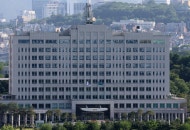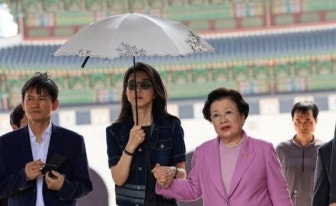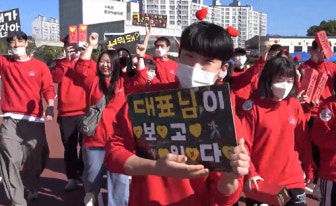| A cosmetics advertisement banner written in Chinese is displayed on a street in Myeong-dong, central Seoul, on Monday, the first day of visa-free entry for Chinese tour groups. (Yonhap) |
Lawmakers clashed over a potential security gap in South Korea’s electronic travel system after a data center fire disrupted parts of the state network over the weekend.
The Justice Ministry briefly posted a notice Saturday allowing foreign tourists to submit e-travel forms without local addresses. By Monday, the notice was removed, but opposition lawmakers said the move posed a serious security risk just as visa-free entry for Chinese group tourists began.
Rep. Na Kyung-won of the main opposition People Power Party said in a Facebook post Monday that omitting address records makes it “impossible to track visa-free entrants after arrival,” complicating post-entry monitoring and on-site control. She called on the government to delay the program until proper safeguards are restored.
| In a screenshot uploaded by Rep. Na Kyung-won to Facebook on Monday, a Saturday notice on the Korea Electronic Travel Authorization website advises applicants to omit the address for their stay. (Rep. Na’s Facebook) |
Also on Monday, People Power Party Supreme Council member Kim Min-soo, speaking at a leadership meeting at the Incheon Tourism Organization, denounced the visa-free policy at a time when the country's data system has been paralyzed as “a dangerous gamble with public safety.”
He warned of illegal stays, organized crime and drug trafficking, and called on the public to remain alert.
People Power Party Chair Rep. Jang Dong-hyeok, after attending a ceremony at the Gen. Douglas MacArthur statue in Incheon the same day, said the government’s first responsibility should be to determine the cause of the blaze and ensure a swift recovery.
Ruling Democratic Party of Korea lawmakers countered that such rhetoric fueled unnecessary hostility toward Chinese people.
Rep. Ko Min-jung wrote on Facebook on Sunday that Na’s remarks reflected “a typical far-right delusion,” while Rep. Kim Tae-nyeon told reporters at the National Assembly that day, “Singling out a particular country to spread fear and hostility is nothing more than a hallmark of the far right.”
Rep. Lee Un-ju added in a Facebook post on Saturday that “irresponsible attempts to spread fake news and stir public anxiety for political gain must stop immediately.”
The Justice Ministry said that the visa-free scheme runs on its own immigration information system, separate from the network affected by the Daejeon fire, and that group participants are screened in advance to exclude those with prior illegal stay records.
Visa-free entry for Chinese group tourists had been effectively halted since 2017, when Beijing restricted group travel in retaliation for South Korea’s deployment of the US THAAD missile defense system.
The program was later formally suspended during the COVID-19 pandemic. Monday’s measure marked a revival after an eight-year pause.
Under the scheme, groups of three or more Chinese nationals traveling with designated agencies can enter without visas for up to 15 days until June 30 next year, with the government projecting about 1 million additional visitors.

















































.png?type=nf190_130)


.png?type=nf190_130)





